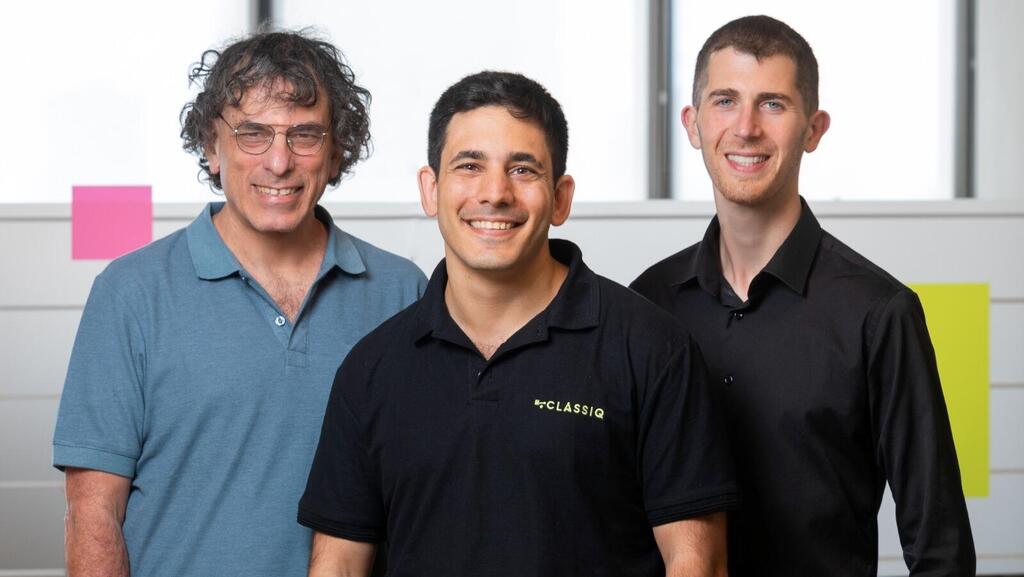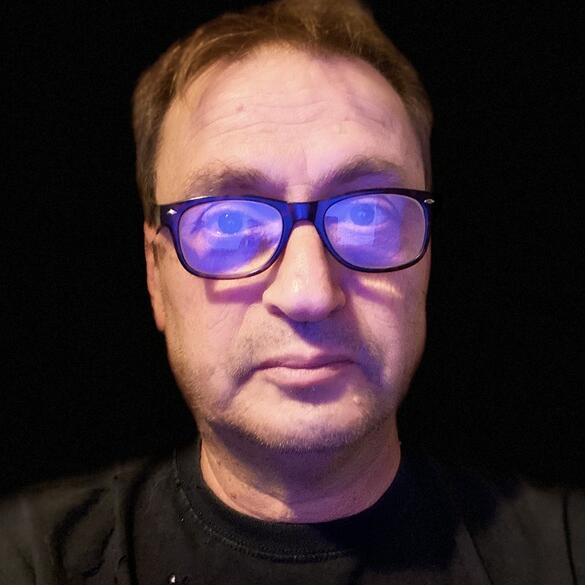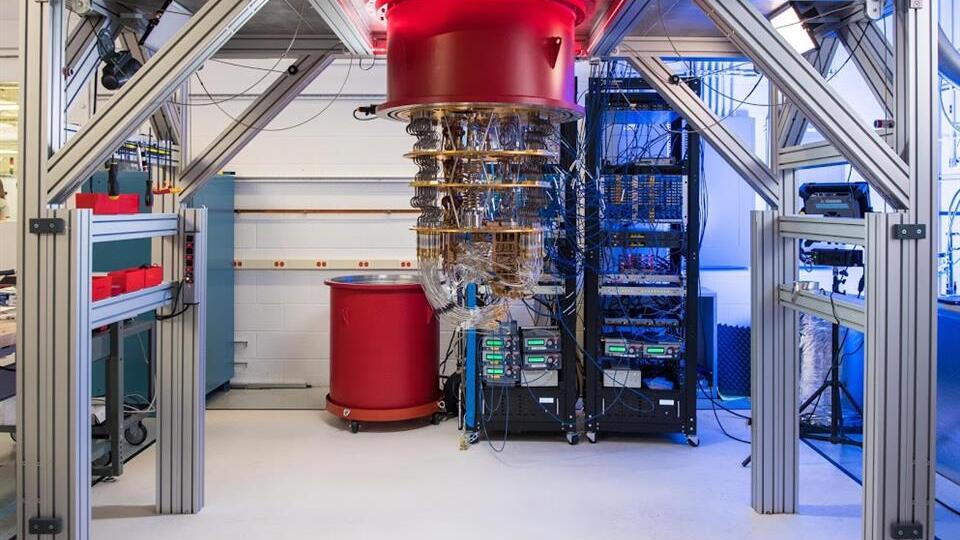Israel’s quantum computing industry is gaining momentum, with increasing sums flowing in from foreign investors. According to industry sources, nearly $1 billion is expected to be invested in Israel’s quantum sector during 2025.
Today, quantum software company Classiq announced a $110 million Series C funding round – the largest ever for a quantum software company worldwide. Until now, Classiq had raised $64 million, and this latest round brings its total funding to $173 million. According to estimates obtained by ynet, the company’s valuation in this round was set at $600 million.
2 View gallery


Classiq's founders (from right to left): Nir Minerbi, Amir Naveh and Yehuda Naveh
(Photo: Eyal Toueg)
In fact, today’s announcement covers only the first part of the round. The company noted that additional strategic investors participated in the round, and will be revealed at a later stage. Once those investors are formally included, the company’s final valuation is expected to be confirmed.
The largest Israeli quantum company is Quantum Machines, which has developed command-and-control systems for quantum computers. In February of this year, the company announced a $170 million funding round, bringing its total capital raised to $280 million. According to an estimate published by Globes, the company was valued at $670 million.
Although the two are not direct competitors, a race has emerged for the title of “Israel’s first quantum unicorn”- the first local company in the field to surpass a $1 billion valuation. Other Israeli quantum startups remain far behind, having raised only tens of millions of dollars to date.
But this race is not just about prestige. Both companies, along with several other Israeli players in the quantum space, hold a significant position on the global quantum computing map. These are computers whose processing power vastly exceeds even today’s most powerful computers. While the technology is still in its early stages, the market is expected to surge in the coming years – much like the AI boom – prompting Israeli companies to work hard to secure a leading role.
Classiq develops software for quantum computers – essentially, an operating system akin to Windows for these machines. The company’s software is compatible with most of the quantum computers currently available, and many of today’s quantum computing deals include Classiq’s platform as part of the package, giving it a substantial share of the market. It competes with IBM’s Qiskit software without any sense of inferiority, and most other startups in this space worldwide are significantly smaller in scale.
The Classiq funding round was led by Entrée Capital, a fund that backed the company from day one at the pre-seed stage. Entrée later succeeded in rallying many additional investors to a sector that, until just a few years ago, was considered highly risky.
New investors in this round include the U.S.-based venture capital giant Norwest Venture Partners (NVP), which has long been active in Israel but is investing in quantum for the first time; NightDragon, the fund founded by Dave DeWalt, former CEO of cybersecurity firm McAfee and chairman of FireEye, who until now had invested exclusively in cybersecurity ventures; Hamilton Lane, a $900 million U.S. financial investment firm with a strong presence in Israel; Israeli fund Qbeat, a newly established fund focused solely on quantum companies; and the institutional investment fund of Clal.
These new backers join Classiq’s existing investors, which include Italian banking fund Neva SGR; Israeli deeptech fund IN Venture; cybersecurity-focused Team8; U.S. fund Wing Venture Capital; Samsung Next, the corporate venture capital arm of Samsung; HSBC; and the Phoenix investment fund. The company’s investors also include prominent figures from the tech world, such as Intel CEO Lip-Bu Tan.
Get the Ynetnews app on your smartphone: Google Play: https://bit.ly/4eJ37pE | Apple App Store: https://bit.ly/3ZL7iNv
Nir Minerbi, CEO and co-founder of Classiq, told Ynet that the purpose of the current funding round is to accelerate the company’s global market penetration in anticipation of the expected surge in the quantum computing field in the coming years.
“There’s going to be serious competition in our field,” he said. “The software layer in quantum computing is strategic for everyone. The question is: where will we be when that competition heats up? That’s why we need to raise capital and move fast now. Embedding our technology deeply in the market before it explodes is critical for activating these growth engines.
In an interview with Business Insider, Dr. Erik Garcell, Classiq’s Director of Quantum Enterprise Development in North America, said: “There’s a lot of talk in the industry about when we’ll have our ‘ChatGPT moment’ – that point when everyone suddenly turns their heads and says, ‘Oh, this technology is real!’ It’s going to make a lot of noise – we just want to be ready.”
Classiq was founded in 2020 by Minerbi, Chief Product Officer Amir Naveh, and CTO Dr. Yehuda Naveh. Minerbi and Naveh are graduates of the elite Talpiot program, and Dr. Yehuda Naveh previously worked at IBM’s research center in Haifa.
Classiq has developed an operating system for quantum computers that enables every organization – even those without in-house quantum computing experts – to develop quantum applications that are hardware-agnostic and do not require an understanding of the underlying physics.
The company already boasts an impressive client list that includes Rolls-Royce, BMW, HSBC, Citi, Toshiba, Deloitte, and other Fortune 500 firms across finance, pharma, energy, and additional sectors, along with government, defense, and academic institutions. “We see an opportunity right now to become the industry standard and ensure that anyone working with quantum systems – today or in the future – will work with us,” says Minerbi.
He adds that the company plans to expand its sales efforts in the U.S., U.K., and Europe and to open local sales offices. Classiq will also accelerate its research and development efforts. “We need to be aggressive in achieving our technological and business goals, while remaining conservative when it comes to timing,” he says.
For now, Classiq’s annual recurring revenue (ARR) remains in the low millions, primarily because clients are still in the experimental phase and not yet using the technology for commercial operations. However, with the anticipated surge of the quantum market, the company expects its revenues to rise significantly. It also plans to expand its workforce, aiming to double its headcount to around 130 employees.
Do you feel that Israel’s quantum industry is becoming a major global player?
“Yes. If you look at where we were four or five years ago, when only the IBM team and Quantum Machines were active here, today you’ll find companies at every level of the stack – including five hardware companies.
"Several multinational corporations have also launched quantum computing operations in Israel. A lot has happened. When you look at the Israeli ecosystem – this quantum hub – we really don’t see many others like it around the world.”
Avi Eyal, Managing Partner at Entrée Capital, which led the round, commented following the announcement: “Quantum computing is advancing rapidly, and Classiq has clearly positioned itself as the leader in the quantum software category.”
Entrée was the first investor in Classiq, backing the company as early as 2018. Since then, the fund has invested in six more quantum-related startups, making it the world’s third-most active investor in the field.
Dave DeWalt, founder and CEO of NightDragon, added: “Quantum computing is one of the most profound technological shifts of our time – on par with the dawn of the internet. Classiq is at the center of that revolution, turning the promise of quantum into practical, secure, and scalable solutions. With this investment, we’re supporting a team that isn’t just building software – they’re shaping the future of global innovation and cybersecurity.”



